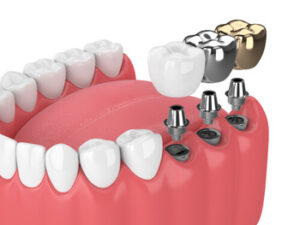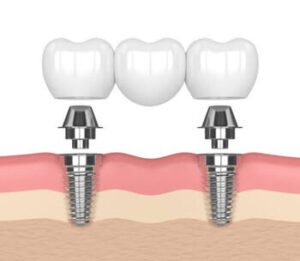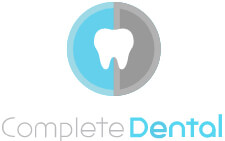Choosing between dental implants and bridges can be perplexing when replacing missing teeth. Both options offer unique benefits, but understanding which one suits your needs best can make all the difference. In this article, we’ll delve into the advantages of dental implants over bridges, ensuring you make an informed decision. Let’s explore these two popular tooth replacement solutions’ nuances, benefits, & considerations.
Let’s Dive In: What Are Dental Implants and Bridges?
Before diving into the comparison, it’s essential to understand dental implants and bridges. Both serve to replace missing teeth, but they do so in fundamentally different ways.
Dental Implants: The Basics

Understanding Dental Bridges
Dental bridges, on the other hand, are fixed prosthetic devices used to replace one or more missing teeth by anchoring them onto the adjacent healthy teeth. Dental crowns are placed over neighbouring natural teeth to securely hold the dental bridge. A dental bridge closes the gap created by the missing tooth with an artificial tooth in between.
Why Dental Implants Are Often the Superior Choice
Now that we have a basic understanding let’s explore why dental implants are often the preferred choice over bridges.
Long-Lasting and Durable
One of the most significant advantages of dental implants is their longevity. With proper care, dental implants can last a lifetime. The titanium material fuses with the jawbone in a process called osseointegration, making it incredibly durable. In contrast, dental bridges typically last between 10 and 15 years before needing replacement.
Bone Health: The Hidden Benefit
Dental implants play a crucial role in preserving the jawbone. When a tooth is lost, the jawbone can deteriorate over time due to scarcity of stimulation. Implants imitate natural tooth roots, stimulating the bone and preventing bone loss. Bridges, however, do not provide this benefit, potentially leading to further bone degradation.
A Natural Look and Feel
Implants offer a natural look and feel that bridges often can’t match. They are designed to blend seamlessly with your existing teeth, providing a realistic appearance and a comfortable fit. Many patients find dental implants feel more like their natural teeth than bridges.
No Impact on Adjacent Teeth: Protecting Your Healthy Teeth
One of the drawbacks of dental bridges is their reliance on adjacent healthy teeth for support. This often involves grinding down these surrounding teeth to fit the bridge, which can compromise their health. Dental implants do not affect adjacent teeth, preserving their integrity.
Better Overall Oral Health
Dental implants contribute positively to overall oral health. Since they do not require alteration of adjacent teeth, they help maintain the health of your remaining natural teeth. Additionally, implants are easier to clean and maintain than bridges, reducing tooth decay and gum disease risk.
The Dental Implant Journey: What to Expect
Understanding the dental implant procedure can help demystify the process and alleviate concerns.
Initial Consultation and Planning
The journey begins with a thorough consultation with an experienced dental professional. During this visit, your dentist will evaluate your oral health, take necessary X-rays, and create a customised treatment plan tailored to your needs.
The Surgical Phase
The next step involves surgically embedding the titanium implant into the jawbone. This procedure is typically performed under local anaesthesia and, in some cases, sedation. The implant is left to heal and integrate with the bone over several months.
Adding the Abutment
Once the implant has fully merged with the jawbone, an abutment is set on top of the implant, connecting between the implant and the dental crown.
The Final Touch: Crown Placement
The final step is attaching the custom-made dental crown to the abutment. This crown is designed to match the colour and shape of your natural teeth, ensuring a seamless and natural appearance.
Comparing Costs: Dental Implants vs. Bridges
Cost is a significant factor when choosing between dental implants and bridges. While dental implants tend to have a higher initial cost compared to bridges, their longevity and benefits often make them a more cost-effective solution in the long run. Despite the higher dental implants cost, their longevity and benefits often make them a more cost-effective solution in the long run.
Upfront Costs
Dental implants typically have a higher initial cost compared to bridges. This is due to the surgical procedure and the materials used. However, bridges might seem more affordable initially but could incur additional costs over time due to their shorter lifespan and potential need for replacement.
Long-Term Investment
When considering the long-term investment, dental implants often prove to be more economical. Their durability and low maintenance requirements can offset the higher initial cost, providing a permanent solution that bridges may not offer.
Health Benefits Beyond Tooth Replacement
When considering tooth replacement options, it’s important to look beyond just filling the gap. Dental implants offer a range of health benefits that go far beyond simply replacing a missing tooth. These advantages can have a profound impact on your overall oral health and quality of life.
Prevention of Further Tooth Loss
Dental implants help prevent further tooth loss by maintaining the health and structure of the jawbone. The jawbone can weaken without stimulation from a natural tooth or an implant, leading to additional tooth loss over time.
Restoring Oral Function
Implants restore full oral function, allowing you to eat, speak, and smile confidently. Unlike bridges, which may feel less secure, implants offer a stable and permanent solution that functions like natural teeth.
Enhanced Self-Confidence
The aesthetic and functional benefits of dental implants can significantly boost self-confidence. After receiving dental implants, patients often feel more comfortable and assured in social and professional settings.
Dental Bridges: A Viable Alternative

Quick Solution
Dental bridges provide a quicker solution for replacing missing teeth. The process can often be completed in just a few dental visits, making it an appealing option for those seeking immediate results.
No Surgery Required
Bridges do not require invasive surgery, which can be a significant advantage for patients who are not suitable candidates for surgical procedures or who wish to avoid the recovery time associated with implants.
Budget-Friendly
The initial cost of dental bridges is typically lower than that of dental implants. Bridges offer a more affordable solution for patients on a tighter budget who want to replace missing teeth.
Weighing Your Options: Tooth Implant vs. Bridge
Choosing between a dental implant and a bridge depends on various factors, including your oral health, budget, and personal preferences.
Factors to Consider
- Oral Health: The condition of your gums and jawbone is crucial in determining whether implants are viable.
- Budget: Consider the initial cost and long-term investment when deciding.
- Longevity: Evaluate the lifespan and durability of each option.
- Aesthetic Goals: Decide which option offers you the most natural appearance and feel.
Consulting with a Dental Professional
The best way to determine the right solution is to consult an experienced dental professional. They can assess your individual needs, provide detailed information, and help you make an informed decision.
FAQs
- Can dental bridges be replaced with implants later on?
Yes, dental bridges can be replaced with implants later on if the patient’s oral health and jawbone condition are suitable for implant placement. Consulting with a dental professional will help determine the best course of action.
- Do dental implants require special maintenance?
No, dental implants do not require special maintenance. Regular brushing, flossing, and dental check-ups are sufficient to keep them in good condition.
- Can anyone get dental implants?
Candidates for dental implants need healthy gums and adequate jawbone to support the implant. A thorough evaluation by a dental professional is necessary to determine eligibility.
- Are dental implants more expensive than dental bridges?
Dental implants have a higher initial cost but are often more cost-effective in the long run due to their durability and low maintenance requirements.
- How long do dental implants last compared to dental bridges?
Dental implants can last a lifetime with proper care, while dental bridges typically last between 10 to 15 years before needing replacement.
Final Thoughts: Making the Right Choice

Remember, maintaining good oral health is crucial, regardless of your tooth replacement option. Regular dental check-ups, proper oral hygiene, and a healthy lifestyle will ensure your new teeth serve you well for years to come.
For a comprehensive consultation and to explore your options between dental implants and bridges, contact us at Complete Dental. Our experienced dental professionals are here to guide you in making the best choice for your dental health.
Contact Coorparoo: 07 3801 6503
Contact Elanora: 07 5235 8199
Note: Any surgical or invasive procedure carries risks. Before proceeding, you should seek a second opinion from an appropriately qualified health practitioner.
References:
Cleveland Clinic. (n.d.). Hypodontia (missing teeth). Retrieved from https://my.clevelandclinic.org/health/diseases/24192-hypodontia-missing-teeth
Colgate. (n.d.). Local anesthesia. Retrieved from https://www.colgate.com/en-us/oral-health/anesthesia/local-anesthesia
News Medical. (n.d.). Dental implant techniques. Retrieved from https://www.news-medical.net/health/Dental-Implant-Techniques.aspx
Healthdirect Australia. (n.d.). What happens during a dental bridge procedure? Retrieved from https://www.healthdirect.gov.au/dental-bridge#:~:text=in%20your%20teeth.-,What%20happens%20during%20a%20dental%20bridge%20procedure%3F,to%20get%20a%20dental%20bridge









